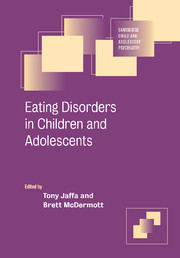
- Cited by 1
-
Cited byCrossref Citations
This Book has been cited by the following publications. This list is generated based on data provided by Crossref.
Hoffmann, B. 2019. DIABULIMIA - CULTURAL DETERMINANTS OF EATING DISORDERS. Trakia Journal of Sciences, Vol. 17, Issue. 2, p. 187.
- Publisher:
- Cambridge University Press
- Online publication date:
- December 2009
- Print publication year:
- 2006
- Online ISBN:
- 9780511543890


